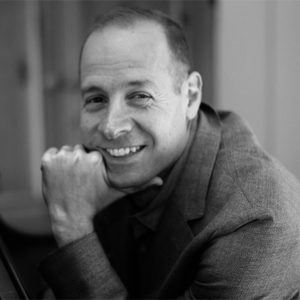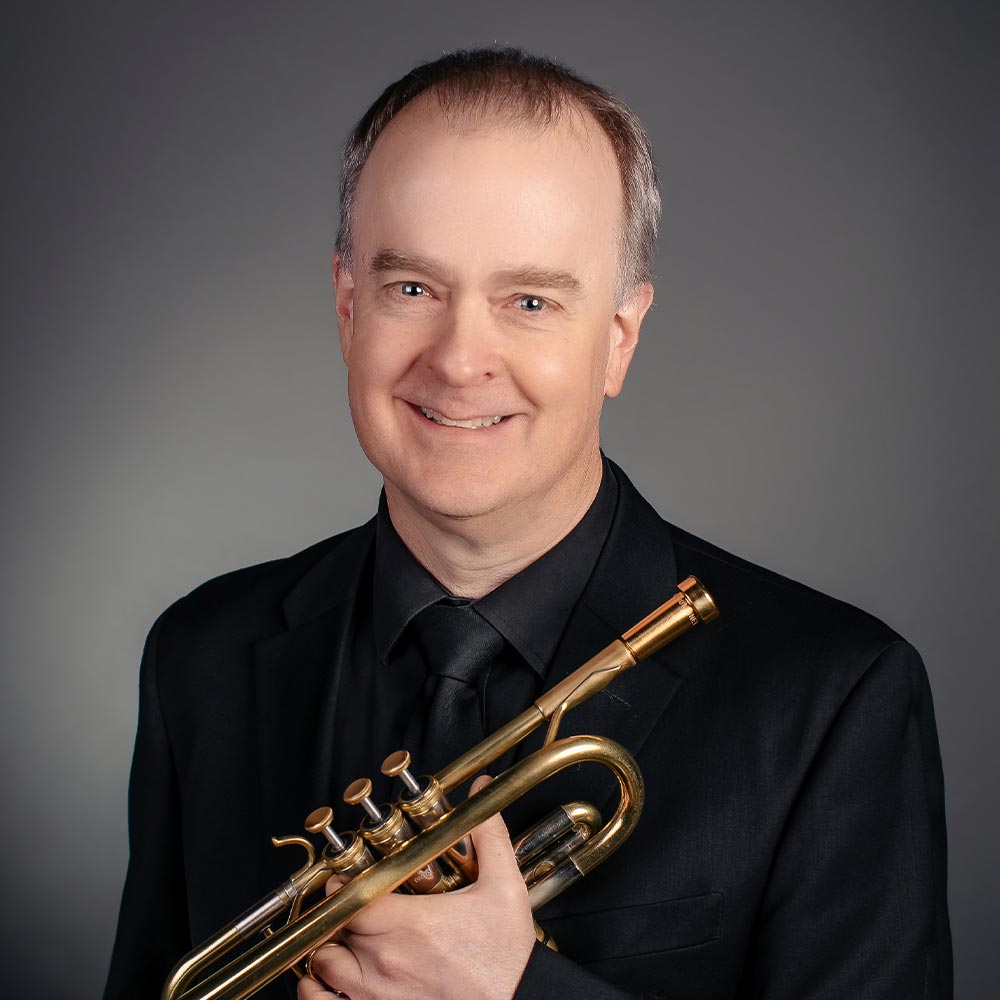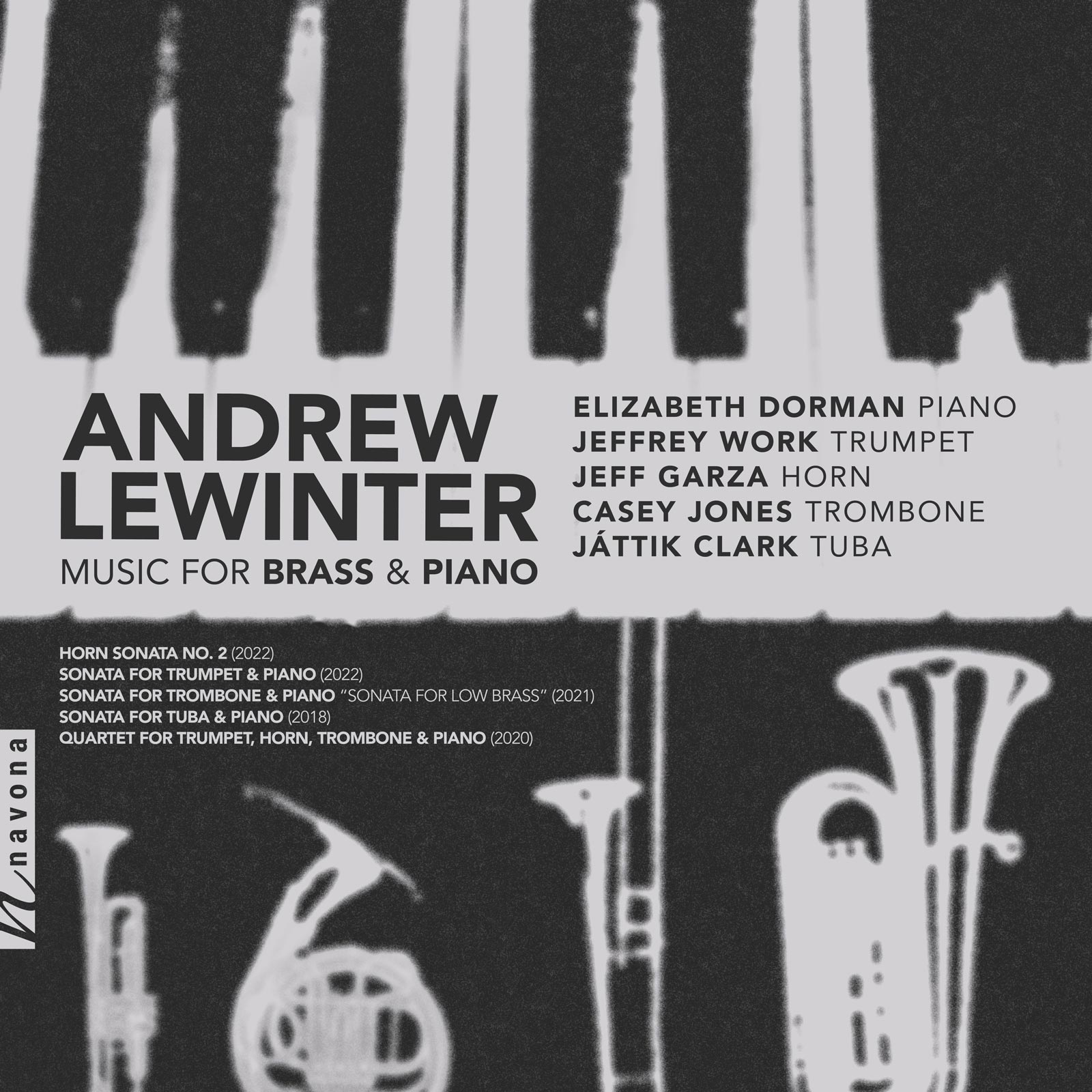Music for Brass and Piano
Andrew Lewinter composer
Elizabeth Dorman piano
Jeffrey Work trumpet
Jeff Garza horn
Casey Jones trombone
JáTtik Clark tuba
Sonatas for brass and piano are a tricky thing to pull off; in consequence, they are few and far between. Andrew Lewinter, himself a long-time orchestral horn player and soloist, has decided to add to the repertoire on MUSIC FOR BRASS AND PIANO: crafting four different sonatas for piano and each instrument of the brass family, and concluding with a dazzling piano quartet.
The tonal language of these sonatas — for piano and trumpet, horn, trombone and tuba, respectively — draws heavily upon the Romantic tradition, but it never copies; rather, it is a reinvention of what Romanticism might have been, had it unfurled in the 21st century. A vibrant arc of suspense gives life to each individual work and, culminating in a grand finale, to the album itself.
Listen
Stream/Buy
Choose your platform
Track Listing & Credits
| # | Title | Composer | Performer | |
|---|---|---|---|---|
| 01 | Horn Sonata No. 2 (2022): Allegro | Andrew Lewinter | Jeff Garza, horn; Elizabeth Dorman, piano | 8:54 |
| 02 | Horn Sonata No. 2 (2022): Adagio | Andrew Lewinter | Jeff Garza, horn; Elizabeth Dorman, piano | 5:44 |
| 03 | Horn Sonata No. 2 (2022): Rondo | Andrew Lewinter | Jeff Garza, horn; Elizabeth Dorman, piano | 6:06 |
| 04 | Sonata for Trumpet and Piano (2022): Allegro | Andrew Lewinter | Jeffrey Work, trumpet; Elizabeth Dorman, piano | 8:19 |
| 05 | Sonata for Trumpet and Piano (2022): Adagio | Andrew Lewinter | Jeffrey Work, trumpet; Elizabeth Dorman, piano | 6:28 |
| 06 | Sonata for Trumpet and Piano (2022): Rondo | Andrew Lewinter | Jeffrey Work, trumpet; Elizabeth Dorman, piano | 6:06 |
| 07 | Sonata for Trombone and Piano ("Sonata for Low Brass") (2021): Allegro | Andrew Lewinter | Casey Jones, trombone; Elizabeth Dorman, piano | 6:11 |
| 08 | Sonata for Trombone and Piano ("Sonata for Low Brass") (2021): Adagio | Andrew Lewinter | Casey Jones, trombone; Elizabeth Dorman, piano | 6:19 |
| 09 | Sonata for Trombone and Piano ("Sonata for Low Brass") (2021): Allegro | Andrew Lewinter | Casey Jones, trombone; Elizabeth Dorman, piano | 6:24 |
| 10 | Sonata for Tuba and Piano (2018): Allegro | Andrew Lewinter | JáTtik Clark, tuba; Elizabeth Dorman, piano | 7:48 |
| 11 | Sonata for Tuba and Piano (2018): Adagio | Andrew Lewinter | JáTtik Clark, tuba; Elizabeth Dorman, piano | 6:36 |
| 12 | Sonata for Tuba and Piano (2018): Allegro | Andrew Lewinter | JáTtik Clark, tuba; Elizabeth Dorman, piano | 6:53 |
| 13 | Quartet for Trumpet, Horn, Trombone, and Piano (2020): Allegro | Andrew Lewinter | Jeffrey Work, trumpet; Jeff Garza, horn; Casey Jones, trombone; Elizabeth Dorman, piano | 4:27 |
| 14 | Quartet for Trumpet, Horn, Trombone, and Piano (2020): Adagio | Andrew Lewinter | Jeffrey Work, trumpet; Jeff Garza, horn; Casey Jones, trombone; Elizabeth Dorman, piano | 5:40 |
| 15 | Quartet for Trumpet, Horn, Trombone, and Piano (2020): Allegro | Andrew Lewinter | Jeffrey Work, trumpet; Jeff Garza, horn; Casey Jones, trombone; Elizabeth Dorman, piano | 6:11 |
Recorded August 23-25, September 13-14, October 23rd, 2023 at the Madeleine Parish in Portland OR
Recording Session Producer Andrew Lewinter
Recording Session Engineer, Editing & Mixing Roderick Evenson
Mastering Melanie Montgomery
Executive Producer Bob Lord
VP of A&R Brandon MacNeil
A&R Danielle Sullivan
VP of Production Jan Košulič
Audio Director Lucas Paquette
VP, Design & Marketing Brett Picknell
Art Director Ryan Harrison
Design Edward A. Fleming
Publicity Aidan Curran
Artist Information

Andrew Lewinter
Before turning his attention to composition, Andrew Lewinter had a long and varied career as an orchestral horn player and soloist. As a composer, Lewinter has a decidedly tonal and neo-romantic style that is often very contrapuntal and always emotionally gripping. His works include sonatas for each of the brass instruments and piano, a quartet for trumpet, horn, trombone and piano, quintets for both horn and string quartet and oboe and string quartet, a woodwind quintet, a string quartet, and a trio for oboe, horn, and piano, among other works scored for a variety of chamber ensembles. Lewinter’s compositions have been widely performed and recorded, and are available on Navona Records and Ablaze records.

Elizabeth Dorman
Praised by Joshua Kosman of the San Francisco Chronicle for her “elegance and verve,” pianist Elizabeth Dorman enjoys performing music both new and old as a soloist and chamber musician.
A finalist of the 2018 Leipzig International Bach Competition, Dorman has been widely recognized as a leading performer for her inquisitive interpretations of Bach’s music on the modern piano. Dorman has appeared as soloist with orchestras including the Louisville Orchestra, the Leipzig Mendelssohn Chamber Orchestra, the Santa Rosa Symphony, the San Francisco Symphony Youth Orchestra, the Folsom Lake Symphony, the Stanford Summer Symphony, Symphony Parnassus, as a soloist for interdisciplinary projects at New World Symphony, and as a keyboardist at the San Francisco Symphony. She can be heard on Delos records as a concerto soloist with Santa Rosa Symphony’s new album celebrating the music of Ellen Taaffe Zwilich and this season will perform as a soloist with California Symphony and Vallejo Symphony.

Jeffrey Work
Jeffrey Work joined the Oregon Symphony as Principal Trumpet in the fall of 2006, following 13 years as an active freelance musician in the Boston area. Since 1999, he has also served as Principal Trumpet of the Colorado Music Festival in Boulder, during its six-week-long summer seasons. As an orchestral musician, Work can be heard on several recordings, most notably as a featured performer on the Oregon Symphony’s acclaimed 2011 release Music for a Time of War. In addition to his orchestral duties in Portland and Boulder, Work performs concerto and chamber repertoire as his busy schedule will allow. His reputation has grown steadily, the press frequently praising him for playing with an artistry not often associated with his chosen instrument. He has given solo performances with the Oregon Symphony, the National Symphony, the Colorado Music Festival Orchestra, the Boston Chamber Music Society, the Boston Philharmonic Orchestra, and The United States Army Band, as well as regional, community, and festival orchestras throughout the country. In 1997, during his third solo engagement with the Missouri Chamber Orchestra, Work recorded the Haydn Trumpet Concerto. In 1998, the Pro Arte Chamber Orchestra of Boston featured him in the world premiere of Eric Ewazen’s “Concerto for Trumpet and String Orchestra” and in 2003 that orchestra joined Work in premiering the “Concerto for Trumpet” by James M. Stephenson.

Jeff Garza
Jeff Garza is principal horn of the Oregon Symphony and the Britt Festival Orchestra. He has previously held principal positions with the San Antonio Symphony and Houston Grand Opera and has served as guest principal horn in dozens of orchestras including the Los Angeles Philharmonic, San Francisco Symphony, Cincinnati Symphony, Saint Paul Chamber Orchestra, New Zealand Symphony, and Melbourne Symphony. Garza is a core member and former Artistic Director of Olmos Ensemble, a chamber music group based in San Antonio TX.

Casey Jones
Casey Jones joined the Oregon Symphony in 2017 as Principal Trombone. Prior to this appointment, he was a principal player in The Florida Orchestra. Jones has played with numerous symphonies throughout the country, including the National, Utah, Vancouver, Sarasota, and Jacksonville Symphonies.

JáTtik Clark
JáTtik Clark was appointed to the position of Principal Tuba of the Oregon Symphony in the Spring of 1999. Since that time, he has become a frequently engaged and highly regarded orchestral, chamber, and solo musician while also cultivating and enjoying prodigious success as a private lesson teacher, collegiate instructor and clinician at the local, regional, and national levels.
Notes
As a young person, I divided my time between composition and horn playing, and ultimately pursued a career as an orchestral musician. I was a professional orchestral horn player and soloist for 14 years of my life, playing principal horn in numerous orchestras, as well as regularly performing chamber music and solos. The experience of performing the standard orchestral repertoire on a full-time basis informs the music that I write. Consequently, since I turned to composition as an adult in 2016, the style and structure of the music I have been writing is decidedly romantic and neo-classical.
I spent approximately two years composing the works on this album. The five works on this album all share a number of attributes. First, they are all in a three-movement sonata form and are written in a tonal and romantic idiom. Second, the opening intervals of the first movement of each sonata are thematically central to the entirety of each piece and run throughout each movement, sometimes in inverted form. That thematic interrelation creates cohesion in each work. Most importantly, however, each of the works on this album strives to paint on as broad a canvas as possible, to effectively use each instrument’s colors, to create a conversation between the instruments, and to create a compelling narrative from start to finish.
— Andrew Lewinter

